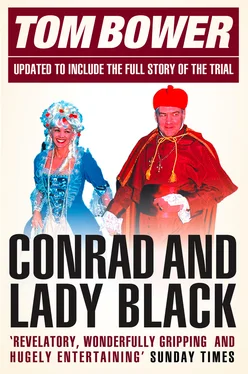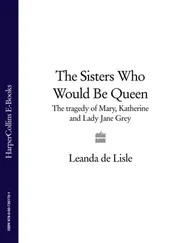Conrad and Lady Black
Dancing on the Edge
Tom Bower

For Ruth
Cover
Title Page
Dedication
Preface
Introduction: The Wedding, 26 January 1985
1 A Timely Death
2 The Stain
3 The Survivor
4 Salvation
5 The Visit
6 Inevitable Union
7 Demons
8 Bliss
9 The Torpedo
10 The A-List
11 Sliding Towards the Edge
12 ‘ Thief! ’
13 The Purist
14 Resurrection
15 The Trial
Index
Acknowledgements
About the Author
Notes
Praise
Other Works
Copyright
About the Publisher
Conrad Black’s email arrived at 1.15 a.m. on 1 April 2006, April Fool’s Day in London. Black, whom I had known since the mid-1980s, was well aware of this book’s progress, and said he had been contacted by many of his and his wife’s acquaintances, seeking his advice as to whether they should talk to me. His response was nothing if not graphic:
Dear Tom ,
Many people have contacted Barbara and me asking if they should talk with you. Our usual response is that you have made it clear that you consider this whole matter a heart-warming story of two sleazy, spivvy, contemptible people, who enjoyed a fraudulent and unjust elevation; were exposed, and ground to powder in a just system, have been ostracised; and largely impoverished, and that I am on my way to the prison cell where I belong. It is the false rise and well-deserved downfall of crooked charlatans; a variant on your treatments of Maxwell, Fayed, and Rowland. You have expressed essentially this view many times that have been reported to me.
He asked me to prove that I was not writing ‘a pompous, defamatory celebration of the supposed demise of people you personally dislike’. In justification of his indignation, and keen that I should understand his innocence, he continued:
The rough facts are that I am an honest businessman; the chances of my committing an illegality are less than zero, this will be clear when my accusers have to prove beyond a reasonable doubt the guilt of innocent people and not just manipulate the agencies of the US and Canadian governments to act on the pre-emptive presumption of guilt and conduct a prolonged assassination of careers and reputations.
Conrad Black believes that he is the victim of political and personal prejudice. He has damned those seeking ‘a big scalp (mine)’, and believes his persecutors first sought his social ostracism and bankruptcy, and later destroyed his ‘fine company’. Under his ownership, he commented with some reason in his second email during the night, the two Telegraph newspapers in London were better ‘compared to what preceded and followed us’. In his opinion, the only victims of his personal and corporate downfall were the creators of a successful enterprise. Other than himself, he argued, no one lost money – shareholders, traders or pensioners. His critics and his American prosecutor contest that claim.
Convinced of his acquittal, Black pledged himself to ‘turn the tables on our oppressors’. He would wreak vengeance upon those responsible for his demise: ‘We will bring this entire, gigantic, malicious persecution down around the ears of its authors.’ He was, he wrote later that night, proud of his robustness. Three years after the news of his predicament emerged, and one year before his trial, he observed that no one could deny that ‘despite my wildly applauded setback I am completely undaunted, and that I am not a tight-lipped source of “no comment”’. Indeed, his high-profile appearances around Toronto had become the stuff of gossip.
In another email during that night, Conrad Black keenly anticipated the stardom that he would achieve at his trial, which was due to start in Chicago in March 2007:
My trial will be timely; Thermidor will have dawned, and legally responsible capitalism will survive, like Talleyrand and Fouché.
He concluded:
I promise a spectacular trial …
Regards, CONRAD BLACK.
Conrad Black’s life story is not the familiar tale of a tycoon’s ‘rise and fall’, or the tragedy of a self-delusional fantasist. Rather, it is the drama of a plutocrat and aristocrat who stands accused as a kleptocrat. He will arrive in Chicago preceded by two damning findings: the first by a court in Delaware, the second by a special committee of investigators appointed with his approval. The investigators’ withering 513-page condemnation of Black’s business methods would have destroyed most men, and his vigorous protestations of innocence have won him some sympathy. The riddle is just how he has found himself in this position. In the search for an answer it is important to understand his marriage to Barbara Amiel, and her own behaviour.
Beautiful, intelligent and vivacious, Barbara Amiel appeared over the years to follow her husband in promoting herself and her opinions. In Toronto, London and New York she became famous for aggressively advancing her libertarian, conservative and politically incorrect philosophy. Exceptionally, she based much of her distinctive and lauded journalism upon her own remarkable life, provocatively describing her personal experiences, especially in relation to drugs, sex, personal relationships and cash. Her 1986 article ‘Why Women Marry Up’ is one of her many prophetic, self-fulfilling accounts of seeking fame and millions which would climax sixteen years later in her immortal admission, ‘I have an extravagence that knows no bounds.’ Quite consciously, she invited the public to examine every aspect of her private life, and in turn wrote revelatory accounts of others’ lives. In many respects she is a unique woman, which was precisely her attraction to Conrad Black.
However, to blame Barbara Amiel for Conrad Black’s apparent downfall would be simplistic. Black is responsible for his own fate, although Amiel undoubtedly influenced the circumstances which have led to him facing his destiny in a Chicago courtroom. She is, of course, not accused of any crime; nevertheless, she did closely accompany him during his meteoric rise after 1992 in London, New York and Toronto. She not only shared his desire for the spotlight, but assumed serious responsibilities in the management of his six hundred newspapers. As a well-paid director of his corporation, she influenced the choice of the papers’ editors, their policies and their appearance. Barbara Amiel is not known ever to have cautioned the staff of those papers to restrain their invasion of other people’s privacy. Her power was never in doubt, not least because she allowed no one to forget her status. In recognition of her contribution, the corporation paid over $1 million of her salary to Black-Amiel Management, an offshore account in Barbados. She also earned substantial sums from stock options, and charged the corporation millions of dollars in expenses for the use of jets, homes, staff and much more. Her conduct made her an important factor in the series of events which has led Lord Black to what for him will be a unique experience – judgement by a jury of twelve common men and women.
Conrad Black’s story is emphatically not a Shakespearian tragedy or the struggle of a flawed hero. In every respect, Black was consciously responsible for his conduct. In the course of the last twenty years, there is no evidence of him confronting dilemmas or crises of conscience about right and wrong. On the contrary, he is proud to have followed his principles. Both Lord and Lady Black are convinced of his inevitable acquittal. But that judgement depends upon an anonymous jury, and there is more than irony in the fact that a man who isolated himself amid privilege throughout his life should now have to rely on the common people to decide his fate. Considering his disdain for the mass censure he has received over the past months, Conrad Black’s certainty that he will be acquitted by a jury is remarkable. The well-educated subject of this book has not taken to heart the lines of John Dryden, the seventeenth-century poet:
Читать дальше













